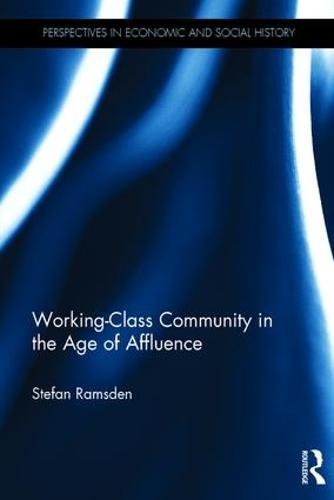Overview
It has appeared to many commentators that the most fundamental change in what it is meant to be working-class in twentieth-century Britain came not as a result of war or of want, but of prosperity. Social investigators documented how the relative affluence of the 1950s and 1960s improved the material conditions of life for working-class Britons whilst eroding their commitment to the shared life of ‘traditional’ communities. Utilising an oral history case study of sociability and identity in the Yorkshire town of Beverley between the end of the Second World War and the election of Margaret Thatcher’s government, Working-Class Community in the Age of Affluence challenges this influential narrative. An introductory essay outlines how sociologists and historians understood the complex social, cultural and economic changes of the post-war decades through the prism of affluence, and traces how these changes came to be seen as deleterious to the ‘traditional’ working-class community. The book then proceeds thematically, exploring change across areas of social life including family, neighbourhood, workplace and associational life. This book represents the first sustained historical analysis of change and continuity in working-class community living during the age of affluence. It suggests not only that older social practices persisted, but also that new patterns of sociability could strengthen as much as undermine community. Ultimately, Working-Class Community in the Age of Affluence asks us to rethink assumptions about the decline of local solidarities in this pivotal period, and to recognise community as a key feature of working-class life across the twentieth century.
Full Product Details
Author: Stefan Ramsden (University of Hull, UK)
Publisher: Taylor & Francis Ltd
Imprint: Routledge
Weight: 0.453kg
ISBN: 9781138207165
ISBN 10: 1138207160
Pages: 206
Publication Date: 02 March 2017
Audience:
College/higher education
,
Tertiary & Higher Education
,
Undergraduate
Format: Hardback
Publisher's Status: Active
Availability: In Print

This item will be ordered in for you from one of our suppliers. Upon receipt, we will promptly dispatch it out to you. For in store availability, please contact us.
Reviews
""Working-Class Community offers an important contribution to the history of affluence and the working classes in modern Britain that should appeal to researchers interested in the interactions between people, society and places. This long-term study shows that affluence was a time of both continuity and change rather than transformation, providing an analysis of different life stages and contexts to critique narrow conceptualisations of community. Reasserting the value of the local, Working-Class Community showcases the complexity that underpinned working-class sociability throughout the twentieth century."" — Isabelle Carter in Contemporary British History, 33:2, 290-291.
Working-Class Community offers an important contribution to the history of affluence and the working classes in modern Britain that should appeal to researchers interested in the interactions between people, society and places. This long-term study shows that affluence was a time of both continuity and change rather than transformation, providing an analysis of different life stages and contexts to critique narrow conceptualisations of community. Reasserting the value of the local, Working-Class Community showcases the complexity that underpinned working-class sociability throughout the twentieth century. - Isabelle Carter in Contemporary British History, 33:2, 290-291.
Author Information
Stefan Ramsden is post-doctoral researcher at University of Hull, UK. After a decade working in the museums sector, he decided to pursue his interest in working-class history through returning to full-time study, and completed a PhD in 2013. Since then he has worked as a history teacher, lecturer and researcher in the University of Hull.




